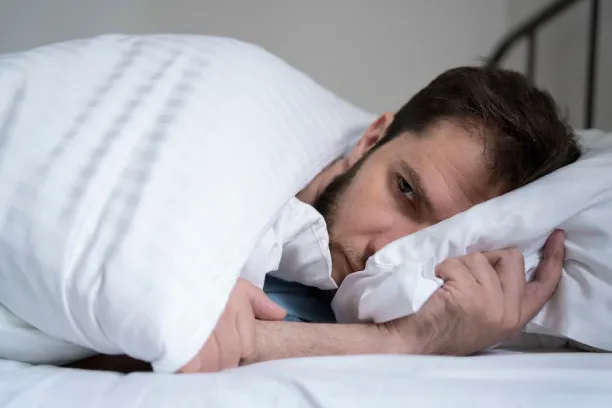


Serotonin
Serotonin is vital for managing sleep, mood, and relaxation. It serves as a precursor to melatonin, the hormone that governs the sleep-wake cycle. Insufficient serotonin levels can lead to insomnia, disrupted sleep, and diminished sleep quality.
How Serotonin Impacts Sleep
Serotonin Aids in Calming the Nervous System
Serotonin Affects REM Sleep (The Deep Sleep Phase)

Dopamine
Dopamine is crucial for managing the sleep-wake cycle, and any imbalances can lead to sleep issues. Elevated dopamine levels, frequently triggered by stress, excessive stimulation (from screens, caffeine, or late-night activities), or specific health conditions, can make it hard to fall asleep due to heightened alertness and racing thoughts. On the other hand, reduced dopamine levels, often associated with burnout, depression, or neurochemical imbalances, can cause disrupted sleep, frequent awakenings, and diminished sleep quality. Given that dopamine encourages wakefulness, achieving a balance through good sleep hygiene, minimizing stimulants, practicing relaxation techniques, and sticking to a consistent sleep schedule can enhance sleep.

Noradrenaline
Noradrenaline, commonly referred to as norepinephrine, is a neurotransmitter that is crucial for the body’s response to stress and for maintaining alertness and arousal. While it is vital for staying focused and responsive throughout the day, elevated levels of noradrenaline at night can hinder the body’s ability to relax and fall asleep. Typically, noradrenaline levels decrease in the evening, allowing the brain to shift into a restful sleep state. However, for those dealing with chronic stress, anxiety, or emotional overload, this reduction does not occur effectively. Consequently, the brain remains in a heightened state of alertness—often described as being "tired but wired"—which complicates the process of falling asleep or staying asleep. Increased noradrenaline stimulates the sympathetic nervous system, leading to physical symptoms such as a racing heart, muscle tension, and shallow breathing, all of which can disrupt sleep. It also affects REM sleep, a vital phase for emotional processing and memory consolidation. This results in poor sleep quality, frequent awakenings, and non-restorative rest.
Are you having trouble falling asleep, staying asleep, or waking up feeling refreshed? Sleep problems are not always simply a result of bad habits—they are frequently linked to hormonal imbalances brought on by stress, fatigue, and burnout. Your sleep-wake cycle, or circadian rhythm, is closely regulated by essential hormones and neurotransmitters.
Adrenaline (Epinephrine)
Adrenaline keeps you alert during stressful situations. It is designed to enable the body to react swiftly in emergencies. When adrenaline levels remain high into the evening (due to chronic stress or overthinking), the body finds it challenging to “switch off.” This results in racing thoughts, trouble falling asleep, and frequent awakenings during the night. It embodies the classic “tired but wired” sensation.
GABA (Gamma-aminobutyric acid)
GABA serves as the primary calming neurotransmitter in the body. It aids the brain in slowing down, which prepares the body for deep, restorative sleep. When GABA levels are low, calming the mind and body before bedtime becomes challenging. This can lead to restlessness, light sleep, and trouble maintaining sleep, ultimately resulting in inadequate recovery and daytime fatigue.
DHEA (Dehydroepiandrosterone)
DHEA has a protective function against stress and promotes brain health along with hormonal balance. Low levels of DHEA are linked to poor sleep quality, particularly in those experiencing chronic stress or hormonal imbalances. It can lead to more frequent awakenings at night and diminishes the body’s capacity to manage stress during sleep.
Cortisol
Cortisol operates on a natural cycle—rising in the morning to help you wake and decreasing at night to facilitate sleep.
Low morning cortisol levels can make waking up difficult, resulting in brain fog and grogginess. A chronic imbalance flattens this natural rhythm, which can cause insomnia or unrefreshing sleep.
Glutamate
Glutamate is the primary excitatory neurotransmitter in the brain, activating neurons and aiding in thinking, memory, and learning.
How Glutamate Influences Sleep:
For the brain to transition into sleep, it must enter a calmer, inhibitory state, primarily facilitated by GABA (the calming neurotransmitter).
This transition makes it more difficult to:
- Fall asleep
- Stay asleep
- Achieve deep, restorative sleep stages (particularly slow-wave sleep)
The Vicious Cycle:
Poor sleep can elevate glutamate levels and hinder its clearance, especially if glial cells are not functioning optimally.
Increased glutamate leads to more overstimulation, resulting in:
- Racing thoughts at night
- Restless sleep
- Early waking with a wired-tired sensation
Research Insight:
Studies utilizing MR spectroscopy have revealed heightened glutamate levels in the anterior cingulate cortex and thalamus of individuals suffering from insomnia.
Additionally, those with chronic sleep deprivation exhibit signs of glutamate accumulation, which negatively affects neuroplasticity and emotional regulation.